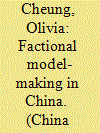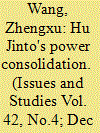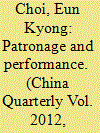| Srl | Item |
| 1 |
ID:
186939


|
|
|
|
|
| Summary/Abstract |
This article introduces the analytical framework of “factional model-making” to describe and explain the open political contention of Chinese Communist Party elites in the policy process. Party elites undertake factional model-making to express policy disagreements and to signal their power to the regime: by flouting the Party line publicly without punishment, they show that they can influence the Party line and therefore pressurize the regime into acknowledging their position in the opaque power structure. This article chronicles the history of factional model-making from the 1960s to 2012 and examines in detail the making of Henan's Nanjie Village into a re-collectivization model by the Party's left. The process began in the 1990s and ended soon after Xi Jinping came to power in 2012, which prompted Nanjie's patrons to recast the village as a Party model trumpeting Xi's line. The suppression of factional model-making under Xi is discussed in the conclusion.
|
|
|
|
|
|
|
|
|
|
|
|
|
|
|
|
| 2 |
ID:
076677


|
|
|
| 3 |
ID:
149335


|
|
|
|
|
| Summary/Abstract |
Political scientists have devoted vastly more attention to general presidential elections than to party nominations for president. This emphasis might be reasonable if parties could be counted on to nominate generic representatives of their traditions. But it is clear that they cannot. Since the party reforms of the 1970s, regulars like Bill Clinton, Bob Dole, and Al Gore have sometimes won fairly easy nominations, but outsider candidates like Jimmy Carter and Howard Dean have made strong runs or even won. 2016 has produced extremes of both types: ultimate regular Hillary Clinton on the Democratic side and far outsider Donald Trump on the Republican side. It seems, moreover, that party regulars are having more difficulty in recent cycles than they did in the 1980s and 1990s. There is therefore some urgency to the question: when and why do party regulars tend to win nominations?
|
|
|
|
|
|
|
|
|
|
|
|
|
|
|
|
| 4 |
ID:
116488


|
|
|
|
|
| Publication |
2012.
|
| Summary/Abstract |
This paper attempts to estimate the impact of both factional ties and economic performance on the promotion of provincial Party secretaries and governors by analysing a person-year dataset of their career mobility for inclusive years 1989 to 2009. We found that for provincial Party secretaries whose promotion meant rising to a top national position, both factional ties and good economic performance increased their chance for promotion. On the other hand, for provincial governors whose promotion meant rising to a ministry-level position, only economic performance mattered for their promotion. Among provincial Party secretaries, the extent to which performance affected the likelihood of promotion was not different between factional members and non-members. This suggests that even factional members needed to show good performance to enhance the likelihood of their promotion.
|
|
|
|
|
|
|
|
|
|
|
|
|
|
|
|